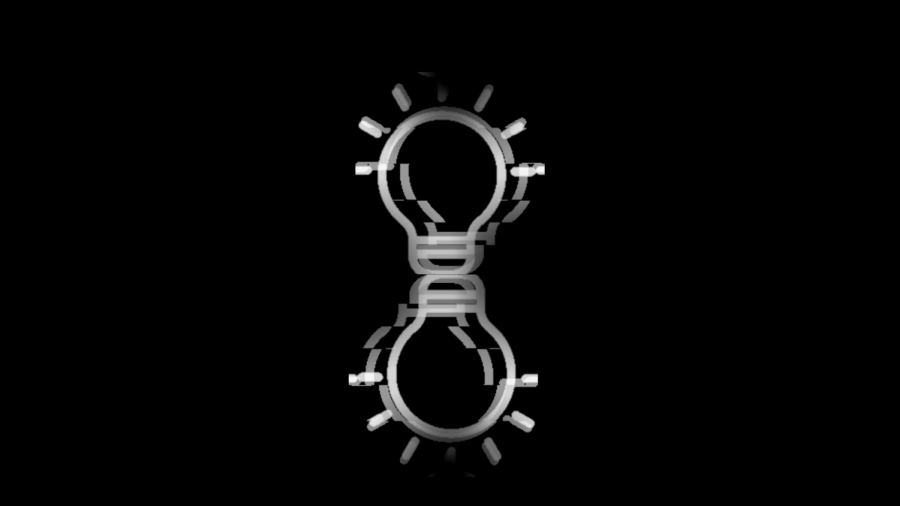Athazagoraphobia: the Fear of Forgetting
Look into the science and life of Dementia patients.
media by Eila Liu
A graphic depicting two lightbulbs displays the duality of memory and identity.
April 30, 2023
Imagine screaming.
Imagine you cannot scream.
Imagine that, as shivers wriggle and permeate your spine, you are unable to express the fear. And as the weight of dread talons at your shoulders, gnawing flesh apart piece by piece, you are unable to scream, beg and cry for help. You have lost yourself to those around you. Yet, here you are. Lucid, unable to express yourself. All that is left is a mind trapped in something akin to a walking carcass.
Everything was fine at first. It was okay to forget a few pieces of information in the already-cramped space of your brain. But then, you slowly forgot the important things, the things that many would call “what makes you who you are.” And as the memories trickle by, all that is left is nothing. Nothing but yourself in the sea of absolute darkness, oh right, do you still remember who you are? You can not scream, you have lost that control. And slowly, something will tighten around your throat, making you forget how to breathe as well.
Welcome to the space of Dementia.
Dementia may not be a concern while young, as it mainly appears in individuals past 65, according to the US National Institute of Aging. Even once you reach the age of concern, pointing out Dementia is hard with no test to determine its presence.
“Dementia is a memory loss disorder different from Alzheimer’s and the difference between the two is how it is started, ” Psychology teacher Kathryn Lemeshewsky said.
Dementia comes in various forms such as Alzheimer’s Disease, vascular Dementia, mixed Dementia, etc. According to the Alzheimer’s Association, Alzheimer’s Disease–the most serious case of Dementia–accounts for 60-80% of cases.
“[My grandma] was okay for a little while and then started to deteriorate very rapidly. It can be very difficult sometimes,” Elsa Swanson ‘25 said.
The condition occurs gradually. Symptoms commonly start off extremely mild, such as forgetting an appointment, planning and making meals, etc. Due to how progressive Dementia is, people often won’t realize it’s there until there’s no going back. Even if people do realize early, Dementia is an inevitability with no cure.
“Over the years, you would see [my grandfather] register less and less until it got to the point where I would walk in and he would smile vaguely, but he literally had zero idea who I was,” Special Education Assistant JoLynn Duris said.
Some may argue that the treatment of Dementia in recent years has made substantial progress with new drugs, such as Lecanemab, being approved for Alzheimer’s treatment. Lecanemab has been shown to reduce the progress of Alzheimer’s by 27% in phase three clinical trial. However, despite the progress, there is no surefire method to slowing Dementia.
The experience is described as confusion and almost dysfunction as casual abilities in daily life become hard to do.
“Some people with Alzheimer’s are living in absolute fear…They’ve just pretty much crawled inside their shell and said, ‘OK, that’s all there is. There’s no more. This is how it’s gonna be’,” Bart Brammer, diagnosed with Dementia, said in an interview with the American Association of Retired Persons.
While some believe Dementia is considered a natural part of aging, it is not. Dementia is induced through damage to the brain cells and each area of the brain is correlated with a different type.
Lemeshewsky claimed that Alzheimer’s begins from a lack of acetylcholine (a neurotransmitter that aids with memory) production in the brain while Dementia is typically triggered by physical damage.
So, in the face of a threatening illness, how can you help?
Those with Dementia eventually cannot make decisions for themselves. Therefore, the U.S. Department of Health and Services suggests communication between the caretaker and the individual in question covering health topics and decisions they would make for themselves. Be kind, respectful and make them comfortable with you.
Furthermore, creating a stable environment in which they are comfortable is extremely important.
The same article from the U.S. Health and Service Department advises the addition of gadgets here and there to help them with daily tasks if they need such as shower chairs and positioning items with sentimental value around the house to help them feel secure while creating a consistent routine for them. In addition, they propose an active lifestyle for individuals with Dementia.
“When I moved out here, it was great to see so much of my grandparents because they were active and were able to move around and chat with us,” Duris said.
In a different article from the U.S. National Institute on Aging (NIA), NIA scientists go more into detail about these activities as they claim it assists the quality of life and abnormal behavioral alterations that come with Dementia. Activities such as making a memory book, going on a walk on a safe pathway, doing yoga, playing board games, etc.
While keeping a balance between helping someone and getting too much into their personal space is hard to manage, respecting personal space is important.
Esther Heerema, a licensed social worker who has aided those with Dementia, from Verywell Health, recommends the use of preferred names, honoring personal clothing choices, direct communication with the individual, knocking before entering the room, a respectful tone, and more.
There are many methods and tactics to aid those with Dementia, and too many to list fully. However, that does not mean there is not a place with a condensation of information for caregivers supporting individuals with Dementia. The U.S. National Institute of Aging has set up a subspace specifically for caregiving with a multitude of links to resources and guidance.
Dementia may be incurable at the current time, but that does not mean the situation is hopeless, even in the face of impediments.



![Minutes before the Activities Fair in the gym, president Abhi Gowda ‘26 prepares the stall for his club Helping Hands, Sept. 4. A relatively new club, Helping Hands was co-started by Gowda and focuses on assisting the homeless, and just last year they succeeded in raising a couple hundred donations to send to shelters. This year, they have goals to expand, with hopes to increase volunteer opportunities and take in-person trips to shelters, as well as extend their help beyond just homeless people. “The Activities Fair gives a lot of underclassmen the opportunity to really get to know the Canyon culture, and it gives them many opportunities for service and volunteering,” Gowda said. “[Through the Activities Fair,] I hope to find a bunch of new and passionate members about our club and just get our name out there and spread awareness to the cause that we’re fighting for.”](https://rockmediaonline.org/wp-content/uploads/2025/09/1-2-1200x885.jpg)







![The winter guard team makes fifth place at the state championship finals in the Denver Coliseum, March 30. The team performed to Barnes Country's “Glitter and Gold,” lead by coaches Margo Sanford, Blair Bickerton and Anna Orgren. In their class there were a total of nine groups participating, and the top five who made it to finals received a plaque. “[Walking onto the stage] is very nerve-wracking, but also very exciting as well. When you first start color guard there's a lot of anxiety and uncertainty when you first perform in front of an audience, but once you've done it for a while, it starts to become the best part of the season,” Ella West ‘25 said. “It's very fulfilling to see an audience react to something you've put your heart and soul into.”](https://rockmediaonline.org/wp-content/uploads/2025/04/Both-socal-media-nd-website-main-1-1200x846.jpg)


![April marks the 25th anniversary of Sexual Assault Awareness Month, created by the National Sexual Violence Resource Center (NSVRC). This month is to spread awareness of the harassment, assault and abuse that happens around the world. The symbol that represented the month was a teal ribbon; however, some survivors of assault create different symbols and movements like the TikTok trend in 2022, where survivors would tattoo Medusa on their body, in honor of her backstory in Greek Mythology. “I don't think [this month is known] at all. I rarely see anybody talk about it. I rarely see much of an emphasis on posting it online, or much discussion about it, and I feel like there needs to be way more discussion,” an anonymous source said. “I think just validating every experience that a person has gone through, regardless of the degree of it, the severity, is an essential step into making sure that people are aware that this is a very real problem in a society and that we need to do better in addressing it.”](https://rockmediaonline.org/wp-content/uploads/2025/04/IMG_0011-1200x900.jpg)












![Lesbian Visibility Day is April 26, and it’s a holiday to celebrate the lesbian community of the world. Lesbian Visibility day was established in 2008 by many queer activists and organizations who sought to raise more awareness for lesbian history and culture. “So this is why during Lesbian Visibility [Day] we celebrate and center all lesbians, both cis and trans, while also showing solidarity with all LGBTQ+ women and nonbinary people,” Linda Reily, in an article written by her, said.](https://rockmediaonline.org/wp-content/uploads/2025/04/Lesbian-Visibility-day.jpeg)






